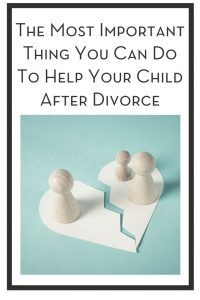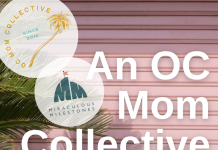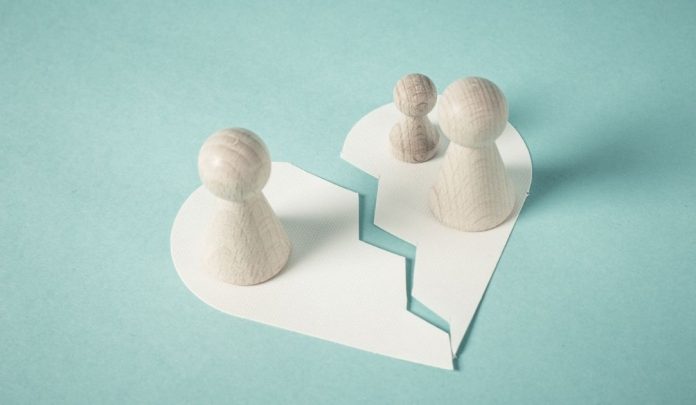Divorce itself isn’t the reason kids suffer.
As a child of divorce, I saw first-hand the damage divorce does to a family. But it’s not the separated homes that cause the problem.
The real suffering from a divorce stems from parents not being able to continue nurturing their children’s sense of connection, belonging, and significance. The loss of the family unit, and the child’s place in it, is what causes the real distress.
Why do you need to help your child after divorce or a parental split?
Children of divorce are often caught between parents competing for the child’s attention as they try to fill their own emotional voids, rather than focus on the needs of their child. As a result, children experience a loss of security, the fear of the unknown, a perceived lack of love, and decrease in emotional connection to their parents who are wrapped up in their own hurt and pain to be present for their children.
So let me say, I’m a fan of trying to make it work – go to therapy, do the difficult work. Marriage is HARD and a good one doesn’t come easy. But, I’m also a realist and know there are certain situations where it’s not going to work. And that’s OK, too.
The idea of staying together for the “sake of the children” is mistaken.
Kids thrive when they have a healthy connection with their parents, and they see their parents have a healthy relationship with each other. And honestly, this can be achieved whether they live in the same house or not. Separated parents with healthy relationships, are way more able to fill their child’s need for belonging and significance than high-conflict parents under one roof.
“Children do better, when they FEEL better.”
– Jane Nelsen
It doesn’t matter where the kids live or who they live with.
Healthy connections can still be achieved, even if not everyone lives under the same roof. Kids are resilient. Healthy divorce (or as Gwyneth Paltrow would say, “conscious uncoupling”) won’t break the kids.
What will break them is if the parents flip out and their sense of belonging is altered.
I recently read an article about two girls, who at the age of three discovered they were switched at birth. The girls ended up being raised by all four parents and eight grandparents – even living under the same roof for a while. Talk about confusing! You would think these “unfortunate” children would grow up completely confused with major attachment issues. But the opposite was actually true, they absolutely thrived.
Look at the Willis-Moore family, The Paltrow-Martins… even Cory and Cheyenne (yep “Teen Mom” is a decade-long guilty pleasure of mine – now you know!). These parents have put their own adult concerns and big feelings aside and focused on the emotional needs of their child first. Unorthodox families aren’t the problem; the problem is that these families are often are dysfunctional. There is fighting, a lack of communication, difficulty putting adult needs to the side.
Conflict isn’t a problem; it’s how the conflict is handled.
How divorced parents model working together and create a new version of the “family unit” can make or break a child’s experience.
My friend Fiona Kong, a single mom of an adorable little boy, recently developed the most amazing tool for co-parents, the Home Sweet Homes Journal, to address this issue head on. Worried her separation was going to traumatize her child and hearing all the horror stories, she developed this journal as a tool for her, her ex, and her son to communicate all together. This notebook reframes a different way for her son to still experience family unity, strength, and security, and to provide a way for her son to safely communicate his thoughts, feelings, and emotions surrounding the divorce to both his parents.
She and her ex have put their own grievances aside for the well-being of their child – and as a result of their efforts their child is thriving.
The journal is an extension of this – their son keeps this gorgeous journal with him as he switches homes. His parents update the journal with him each day. Honestly, it’s brilliant! (If you like the journal idea you can start with a simple notebook or check out Fiona’s journal here.)
It’s because they put their son’s emotional well-being above everything else that he is a happy, thriving little boy.
As a parent coach, I work with parents in so many different situations, up against all sorts of parenting challenges. They search high and low for simple “solutions.” Should I buy my kids a gift to show my love? Should I “give in” and let them do what they want? Should I put my foot down and tell them who’s boss? No. No. And no.
Whatever your challenge is – building a strong connection is the number one tool to solve any parenting problem.
And, in many ways, focusing on connection is a simple solution – it costs no money and can be done any time of day.
So, if you are like my friend Fiona and freaking out about the effects of your divorce or separation on your child, you can still take action to help your child flourish (don’t worry – you don’t have to create a journal like she did – LOL).
Just do one thing to help your child after divorce – focus on connection.
That’s truly all your kids need right now. They just want you, and your ex, but not necessarily together. They want to still feel as though they are part of a secure family unit and are undoubtedly and fiercely loved by both parties. Smother your child with love, connect with them, and put aside your own hurts with your ex to make sure the family bond continues regardless of everyone’s physical location.
Has your family been through a split? Let us know in the comments what you and your partner did to help your child after divorce to thrive and feel loved.














